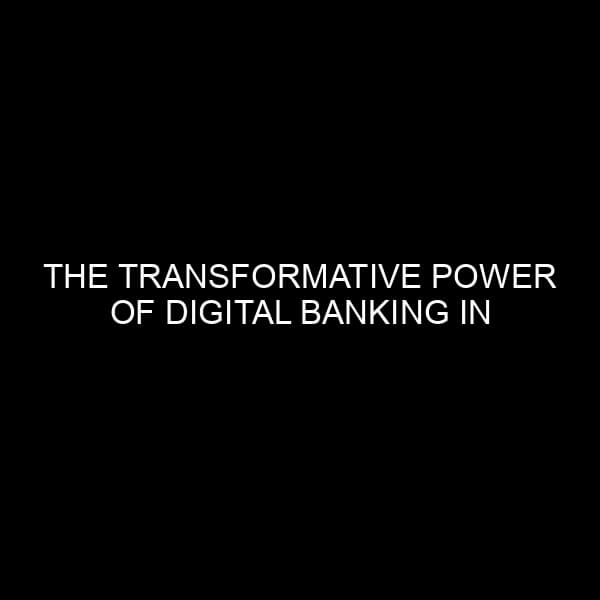The Transformative Power of Digital Banking in the 21st Century
In today’s digital age, where smartphones dominate our daily lives and online transactions become the norm, banking has undergone a radical transformation. This transition from traditional brick-and-mortar banking to digital platforms isn’t just a superficial change; it represents a fundamental shift in the way people manage their finances. Having witnessed this shift first-hand in the financial market and banking industry, it’s evident that digital banking is redefining the very concept of banking for billions worldwide.
The Evolution of Digital Banking
To understand the depth and scale of this transformation, we must first trace back to the roots of digital banking. The idea of managing money digitally isn’t new; it began in the 1960s with the advent of ATMs. But in the early 2000s, as internet connectivity proliferated, banks started offering online platforms, letting customers conduct basic transactions without visiting a branch.
The real game-changer, however, came with smartphones. Banking apps brought the bank into people’s pockets. In less than two decades, these platforms have evolved from merely providing transactional services to encompassing a complete financial management system, including budgeting tools, investment options, and financial education resources.
Benefits of Digital Banking
a) Convenience and Accessibility
The foremost advantage is the convenience it offers. Customers can access their accounts, make transactions, or check balances anytime, anywhere. Gone are the days when one had to visit a bank for simple tasks.
b) Cost-Efficiency
From a banking perspective, digital platforms reduce the overhead costs associated with maintaining physical branches. These savings often translate to lower fees and better interest rates for customers.
c) Enhanced Features
Modern banking apps offer a plethora of features, from budget tracking to personalized financial advice. Some even allow for cryptocurrency transactions, integrating the newest forms of currency into traditional banking systems.
Challenges in Digital Banking
But like any innovation, digital banking isn’t without challenges.
a) Security Concerns
The digital platform opens doors to potential cyber-attacks. Banks continuously invest in enhancing cybersecurity, employing cutting-edge technologies to ensure data privacy and security.
b) Digital Divide
While many have embraced digital banking, a significant portion of the global population remains without reliable internet access. Bridging this digital divide is crucial to ensure the inclusiveness of digital banking benefits.
c) Regulatory Challenges
As with all things finance, regulation plays a pivotal role. The digital nature of these transactions crosses traditional boundaries, leading to potential regulatory challenges, especially in cross-border transactions.
The Future of Digital Banking
Considering the rapid advancements in technology, it’s not far-fetched to imagine even more integration of our daily lives with our financial management. We might see:
a) Integration with IoT (Internet of Things)
Your fridge could potentially order groceries and make payments directly. Your car could pay for fuel or charging without you even taking out your phone.
b) AI-Powered Financial Advice
While we already see the rudiments of this with chatbots, the future might hold AI financial advisors providing personalized advice based on individual financial behaviors and market trends.
c) Blockchain and Banking
The decentralized nature of blockchain can provide unparalleled security and transparency. It’s only a matter of time before banks integrate blockchain into their core systems for transactions and record-keeping.
Conclusion
Digital banking is not merely a trend; it’s a transformative shift in the world of finance. It presents a myriad of opportunities and challenges alike. But by understanding and navigating these, banks and customers can unlock an era of unprecedented convenience, efficiency, and innovation.
As someone who has been part of the financial market and banking industry, witnessing this transformative journey has been nothing short of fascinating. Digital banking, in essence, captures the spirit of the 21st century – integrating technology and finance to make our lives more connected, efficient, and forward-looking.






